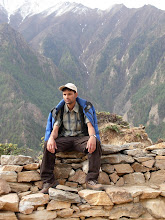Nepalese tourism industry depends on its rich natural and cultural treasures. High snow-capped mountains, wildlife, dense forests, flora and fauna, bio-diversity, rushing rivers, lakes and different verity of living species account for Nepal’s immense natural assets for tourism whereas ancient monuments, arts and architectures, feasts and festivals, languages and cultures stand out as cultural properties of the country. Climate change directly affects the natural and indirectly affects the cultural aspects of Nepal’s unique tourism products.
Kathmandu (AsiaNews) - Foreign tourists who visit Nepal must personally plant a tree or sponsor one, to reduce the effects of climate change and contribute to the protection of the environment. The decision comes from Nepal's tourism board, on the occasion of the "World Day of Tourism", celebrated last September 27 with the slogan: "Tourism Responding to the Challenge of Climate Change.”
The government initiative will last for one year, concluding on September 27, 2009; according to Prachanda Man Shrestha, head of the tourism board, the tax is the price that "tourists will have to pay for their contribution to carbon emissions generated through the goods they use while in Nepal". The funds will be used to "promote sustainable development", and will be collected in all 75 districts of the coun.jpg) try; the tourism ministry and tourism board have provided 14,000 U.S. dollars to fund the project, a figure that will increase with the contributions made by tourists.
try; the tourism ministry and tourism board have provided 14,000 U.S. dollars to fund the project, a figure that will increase with the contributions made by tourists.
Hisila Yami, the Nepalese minister for tourism and civil aviation, stresses the importance of "environmentally sustainable tourism", and calls upon domestic and foreign tourists to "contribute to the protection of nature and of the beauty of the country" with lifestyles of "low environmental impact". Nepal is a destination for tourists worldwide because of its mountain climbing, fascinating Himalayan landscapes, and broad valleys. The minister decided to take part personally in the initiative, donating 136 U.S. dollars from his own pocket for the environmental fund.
Finally, in order to ensure the safety of foreign tourists, the tourism board has provided a telephone number to be contacted in case of emergencies or necessities, active around the clock for unrestricted access by the visitor.
The government initiative will last for one year, concluding on September 27, 2009; according to Prachanda Man Shrestha, head of the tourism board, the tax is the price that "tourists will have to pay for their contribution to carbon emissions generated through the goods they use while in Nepal". The funds will be used to "promote sustainable development", and will be collected in all 75 districts of the coun
.jpg) try; the tourism ministry and tourism board have provided 14,000 U.S. dollars to fund the project, a figure that will increase with the contributions made by tourists.
try; the tourism ministry and tourism board have provided 14,000 U.S. dollars to fund the project, a figure that will increase with the contributions made by tourists.Hisila Yami, the Nepalese minister for tourism and civil aviation, stresses the importance of "environmentally sustainable tourism", and calls upon domestic and foreign tourists to "contribute to the protection of nature and of the beauty of the country" with lifestyles of "low environmental impact". Nepal is a destination for tourists worldwide because of its mountain climbing, fascinating Himalayan landscapes, and broad valleys. The minister decided to take part personally in the initiative, donating 136 U.S. dollars from his own pocket for the environmental fund.
Finally, in order to ensure the safety of foreign tourists, the tourism board has provided a telephone number to be contacted in case of emergencies or necessities, active around the clock for unrestricted access by the visitor.



No comments:
Post a Comment